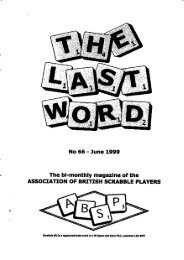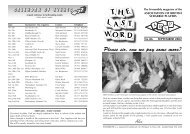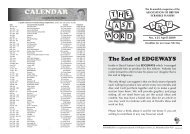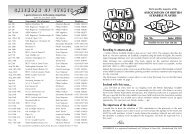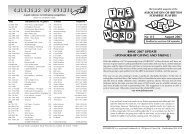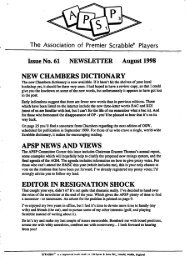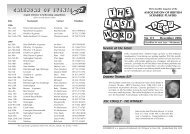TLW120 - Nomads Results
TLW120 - Nomads Results
TLW120 - Nomads Results
You also want an ePaper? Increase the reach of your titles
YUMPU automatically turns print PDFs into web optimized ePapers that Google loves.
grounding. I then started to focus on combinations (6+1, 7+1, 6+2) for bingo study. This<br />
was helpful at the time, but since the advent of LeXpert and Zyzzyva with their ability to<br />
produce word lists in probability order, I now study anagrams and hooks virtually<br />
exclusively in this manner, mainly onscreen but sometimes using printouts. I use<br />
Jumbletime to test my knowledge and train my speed of recall, rather than as a wordlearning<br />
tool. I examine many of my tournament games using Quackle simulations, and<br />
quite often play through libraries of other games online (including TWL games from US<br />
websites which tend to be more voluminously supplied). I am also a fan of tough cryptic<br />
crosswords, so have spent many hours trawling through dictionaries.<br />
Can you say roughly what proportion of your study time you spend on each of the word lengths<br />
from 4 to 8?<br />
I probably concentrate too much on bingo sets overall (including a bit of work on nines).<br />
Recently I have been reviewing the fours, and will start revision of the fives before long. I<br />
have been through all the sixes at one time or another, but these would be the weakest part<br />
of my armoury. I have no set proportion of study time devoted to word lengths, but just plan<br />
things in accordance with what I wish to focus on over a period.<br />
I study in probability order, but aim to cover all words.<br />
Do you use any mnemonic techniques, e.g. anamonics, associative phoneys, or the kind of more<br />
elaborate techniques described in ‘How To Win at Scrabble’?<br />
Not consciously or extensively. There are always some patterns that can be detected in<br />
word study – I mean words that the mind tends to group together, like<br />
PAILLARD/PALLIARD/GAILLARD/GALLIARD – and using these is a form of mnemonic<br />
technique. Anamonics have the drawback that they often need to be updated when the<br />
wordlist changes.<br />
When you analyse your own games, do you find that when you miss the optimum move, this is<br />
most often a) because you simply don’t know the word, b) because you know the word but don’t<br />
find it or c) because you know the word and find it but fail to recognise that it is the optimum<br />
move?<br />
Many of my misses are simply through doziness, e.g. missing front hooks, or not noticing<br />
multiple overlap plays; sometimes I am guilty of not looking in all areas of the board (so<br />
that I might miss XENIC, for example, from an initial X); and sometimes I miss words that<br />
have not embedded themselves sufficiently strongly in my mind (e.g. a recent miss of<br />
BRUXED, which theoretically I ‘know’ perfectly well but which did not suggest itself during<br />
the game). I have a fairly good sense of what will simulate well, but this sometimes leads<br />
me into rash decisions such as opening up TWS files when I have the game sewn up: one<br />
must remember that the ‘best’ move is not always the winningest move.<br />
Can you give a rough idea of what proportion of the current SOWPODS lexicon up to and<br />
including 8 letter words you would claim that you do know, in the sense of being able to state<br />
confidently that any given word from it is valid or not?<br />
Nearly all.<br />
34<br />
Do you attempt to ‘peak’ for certain events (i.e. intensify your study)?<br />
I try to keep at a consistent level generally, but the advent of a major international<br />
tournament tends to inspire me to increase the rate somewhat.<br />
To what extent do you find that once you have learnt words you tend to remember them and to<br />
what extent do you find that your word knowledge suffers from ‘fade’ and requires constant<br />
reinforcement?<br />
They generally stay put, but some are difficult to master (e.g. the Maori words and their<br />
hooks). If I stopped studying completely, there might be a degree of fade but I think the<br />
words stay fresh because I am constantly reviewing something.<br />
How interested are you in the meanings of the words, on a scale of 1 to 10?<br />
8-9. I can recall words without knowing their meanings, but I am always interested, and<br />
tend to store this information away as well (without guaranteeing accuracy).<br />
Would you describe your attitude towards significant extensions to the Scrabble lexicon (such<br />
as happened with the change to OSWI and last year to Collins) as apprehension, excitement or<br />
something between?<br />
I sometimes find them daunting, and some of the fatuous inventions foisted on us by Collins<br />
were highly annoying, but I enjoy studying words. On a scale of 1 to 10 with excitement<br />
at the top, I would say 9.<br />
Do you feel that as far as individual tournaments go, being ‘in form’ plays a significant role<br />
in Scrabble success, or that any such factor is swamped by the luck of the tiles?<br />
Assuming you are relatively fit (i.e. not ill, jetlagged or unduly drunk), and if you keep the<br />
desired equable temperament, then it’s just a matter of the tiles you draw, and the result of<br />
the previous game should have no bearing on the next one.<br />
How much do you think success at Scrabble depends on a natural ability which, perhaps like<br />
musical ability, one tends to have or not have and how much do you think it is overwhelmingly<br />
a matter of application?<br />
Some people study quite extensively but never seem to progress much. That suggests to me<br />
that a certain level of innate ability is needed as a starting-point.<br />
Do you feel that you yourself have pretty much got as far as you’re going to in the game, or<br />
do you feel that you have the potential to get (even) better?<br />
I don’t think I will get significantly better unless I am able to retire while still compos<br />
mentis, and devote even more time to the game. There are faults in my game which I<br />
recognise but which are still hard to eliminate, and I don’t think word knowledge is a<br />
weakness (in other words my faults are probably character- or temperament-driven).<br />
Do you think that you would study more and take the game more seriously if the material<br />
rewards were greater, e.g. serious prize money in tournaments?<br />
That is a plausible scenario.<br />
35



